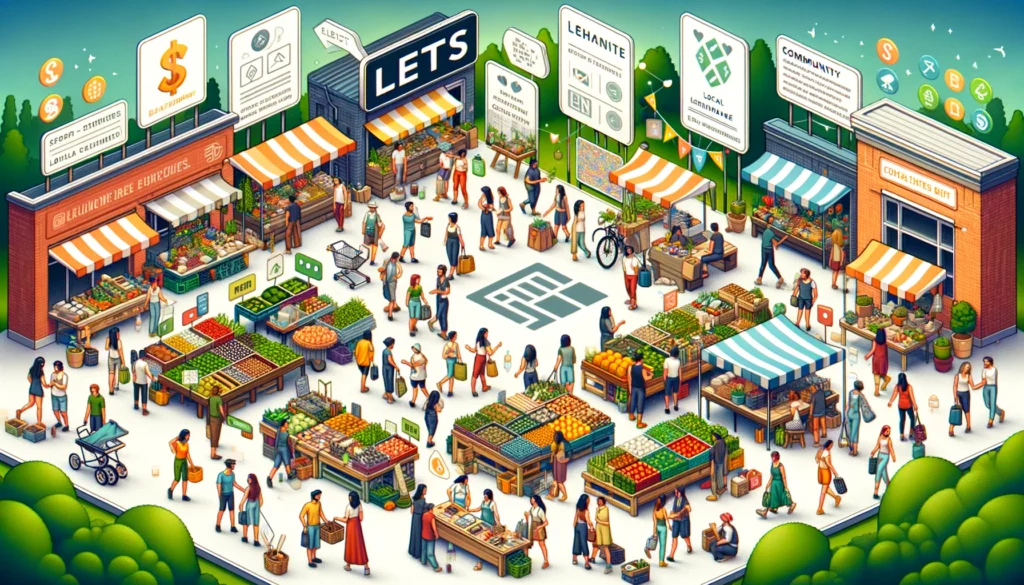In a world increasingly concerned with sustainability and equity, the age-old practice of bartering is making a remarkable comeback. This new barter economy isn’t just about swapping items in a marketplace; it’s about redefining how we value goods and services in a way that benefits our communities and the planet. Let’s delve into how modern bartering systems are fostering sustainable and inclusive economic practices.
 Local Exchange and Trading Systems (LETS)
Local Exchange and Trading Systems (LETS)
Local Exchange and Trading Systems (LETS) are community-driven initiatives that breathe new life into the concept of bartering by using local currency or credits. These systems are designed to bolster local economies by keeping trade within the community, thereby reducing the need for external financial resources. LETS empowers participants to trade goods and services ranging from home repairs to homemade bread, all without exchanging a single dollar. The beauty of LETS lies in its ability to value everyone’s contributions equally, whether it’s a professional service or a homegrown product. By fostering a sense of community and self-reliance, LETS not only supports sustainable living but also builds stronger, more connected neighborhoods.
Digital Platforms for Barter
In today’s digital age, bartering has transcended physical marketplaces to thrive online. Digital platforms for barter leverage technology to connect people who have something to offer with those who need it, regardless of their location. These platforms range from websites dedicated to specific items or services to apps that facilitate broader exchanges. Users can list items they wish to barter, search for specific goods or services they need, and arrange exchanges directly. This digital evolution of bartering makes it more accessible and convenient, opening up endless possibilities for sustainable and equitable trade on a global scale.

Community-Supported Agriculture (CSA) and Food Swaps
Community-supported agriculture (CSA) programs and food swaps are prime examples of how the principles of bartering and community engagement can transform our food systems. In a CSA, individuals pre-purchase a share of a local farm’s anticipated harvest, directly supporting farmers while receiving fresh, seasonal produce throughout the farming season. This model not only ensures financial security for farmers but also fosters a closer connection between consumers and their food sources. Similarly, food swaps provide a platform for individuals to exchange their surplus homegrown produce, homemade goods, or foraged foods, encouraging local consumption and reducing food waste. These initiatives promote a more sustainable, circular food economy rooted in community and cooperation.
Skill Sharing and Time Banks
Skill sharing and Time Banks are transforming the way communities value and exchange services. In these systems, the currency isn’t money but time, creating an equitable platform where everyone’s skills, from gardening to web design, are valued equally. Members spend hours offering their skills and earn credits for each hour of service provided. These credits can then be used to receive services from others in the network. This model promotes a culture of learning and mutual support, where the wealth of a community is measured not in dollars but in shared knowledge and assistance. It’s a powerful way to build community ties, as it encourages people to look to their neighbors for help and to offer their skills in return, fostering a sense of belonging and collective resilience.
 Economic Resilience and Inclusion
Economic Resilience and Inclusion
The new barter economy, particularly through mechanisms like LETS, digital platforms, and Time Banks, offers a model of economic resilience and inclusion. In times of financial uncertainty or economic downturns, these systems provide a crucial safety net, allowing people to access goods and services even when traditional currency is scarce. They promote a more equitable distribution of resources, ensuring that everyone, regardless of their economic status, can participate in and benefit from the economy. This inclusivity strengthens communities, making them more resilient to economic shocks and stresses. By valuing contributions beyond financial means, the new barter economy challenges traditional economic models and paves the way for a more inclusive, sustainable future.
Global and Local Impact
While deeply rooted in local communities, the principles of the new barter economy have a significant global impact. International barter exchanges allow businesses to trade goods and services across borders without the need for traditional currency, fostering direct, equitable trade relationships. This global network demonstrates the scalability of barter as a viable economic model, capable of supporting not only local economies but also facilitating international trade more sustainably and equitably. The global reach of the new barter economy showcases its potential to address global challenges such as economic inequality and environmental degradation, proving that local actions can have worldwide implications.
Author’s Note
Thank you for exploring the fascinating world of the new barter economy with me. As we seek more sustainable and equitable ways to live and trade, the principles of bartering offer a hopeful glimpse into a future where our economic systems support both people and the planet. Let’s continue to champion these community-driven initiatives and embrace the possibilities they offer for a more sustainable world.
G.C., Ecosociosphere contributor.
References and Further Reading
- “Local Exchange Trading System: What it Means, How it Works” – Investopedia
- “Sharing is Good: How to Save Money, Time and Resources through Collaborative Consumption” by Beth Buczynski.
- Community Supported Agriculture (CSA) resources: https://www.localharvest.org/csa/





Comments
Can you be more specific about the content of your article? After reading it, I still have some doubts. Hope you can help me.
Thank you for your sharing. I am worried that I lack creative ideas. It is your article that makes me full of hope. Thank you. But, I have a question, can you help me?
Your point of view caught my eye and was very interesting. Thanks. I have a question for you.
Can you be more specific about the content of your article? After reading it, I still have some doubts. Hope you can help me. https://www.binance.com/tr/register?ref=W0BCQMF1
Can you be more specific about the content of your article? After reading it, I still have some doubts. Hope you can help me.